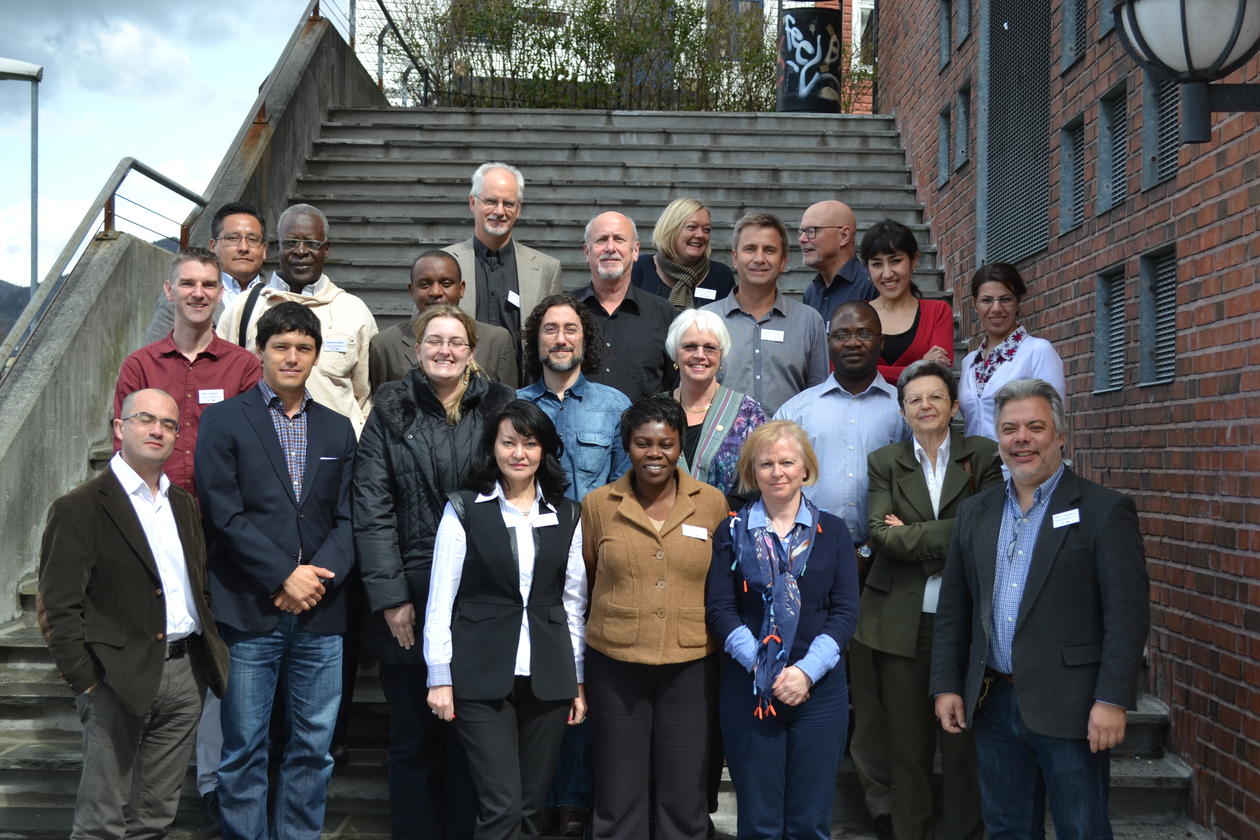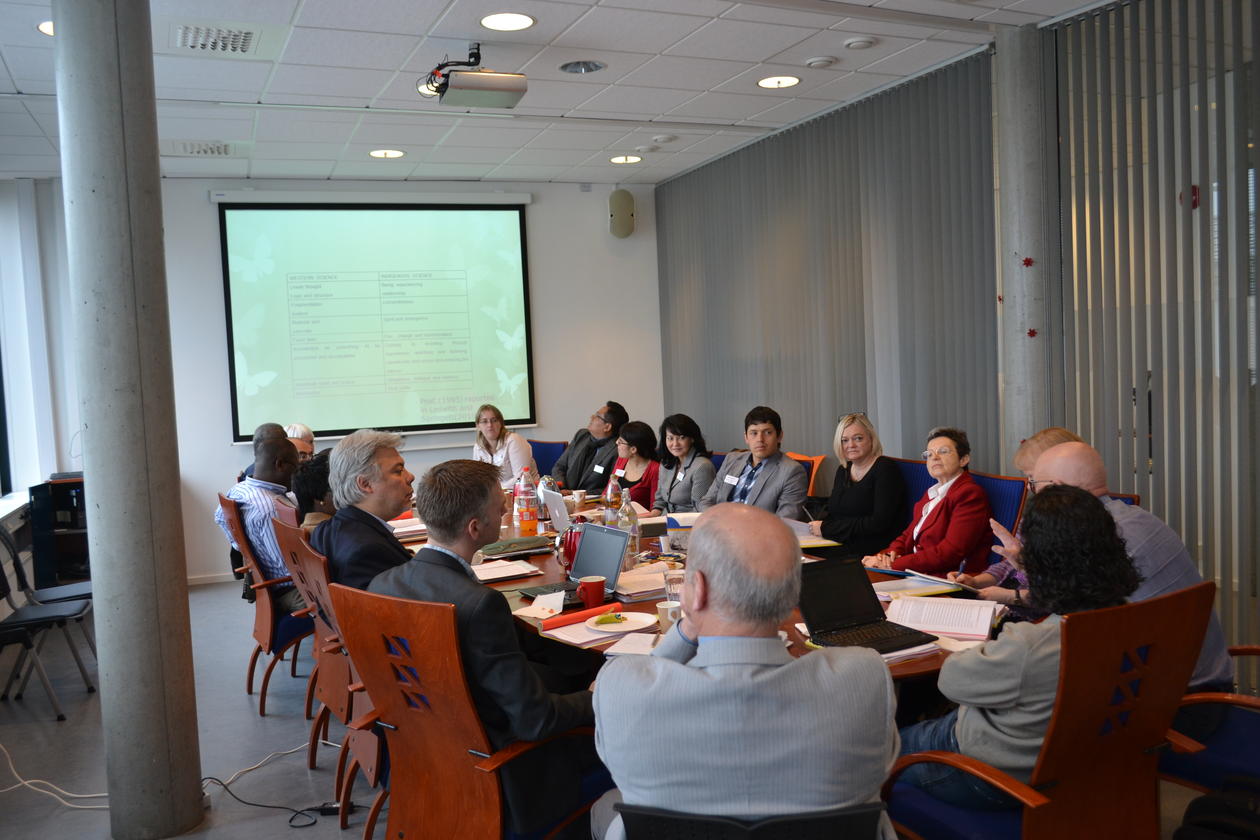Making the Case for Transdisciplinary Approaches to Development and Sustainability
The complexity of the fundamental problems facing humanity requires academia to re-examine its own role. This was the topic of a recent workshop at UiB.
Main content
The workshop “Transdisciplinary development and sustainability science for social change” took place from 13 to 15 May, and was organized by the project “Bridging health promotion and sustainability science: Transition to the green economy”.
The participants represent 11 different academic institutions from all continents, and have backgrounds in psychology, epidemiology, human ecology, integrated human studies, business and management science, medicine, developmental studies, health promotion, environmental medicine & science, sustainability science, international health, and poverty policy studies. The aim is to write a book based on the workshop presentations and discussions.
The book project is led by Professor Mittelmark, head of the Department of Health Promotion and Development, in collaboration with Professor Gro Th. Lie, academic coordinator at UiB Global, and Alberto Cimadamore, head of the Comparative Research Programme on Poverty (CROP).
Reversing the compartmentalisation of academia
The project is a collaboration to bridge two research arenas; human development and sustainability science. The workshop therefore had the purpose of gathering an international group of scholars representing different disciplines, in order to find and build on common ground.
During three intensive days the discussions centred on the fundamental questions regarding transdisciplinary research (TDR), which aims to solve vital social problems, to bridge the gap between the research approaches of different disciplines, and to include stakeholders outside academia as equal partners:
How can we better connect social and environmental sciences, to enhance the well-being of people and their environments, especially in the context of poverty?
The challenge in this regard is to cross the cultural bounds separating academic specialties to be able to work together synergistically for development. The specific models, theories, methods and concepts of individual disciplines are certainly key to scientific progress, but this also leads to a compartmentalisation in which communication and collaboration on complex social challenges are made difficult.
The development of transdisciplinary approaches to development and sustainability therefore requires a concerted effort in several phases over a longer period of time. The workshop constituted the first step in this extensive research initiative.
Click here to learn more.
The initial step of understanding each other across disciplines could not be taken for granted, but the participants managed to build a constructive dialogue. Gro Th. Lie was impressed by the level of commitment:
– Before the workshop the participants had all committed themselves to writing a book chapter, and everyone had read all the drafts that had been distributed beforehand. Everyone came very well prepared. This shows remarkable dedication and concern for the global future, says Lie.
Explaining the need for transdisciplinarity
In addition to the book workshop there was an open session on the last day, at the Bergen Resource Centre for International Development. Jane Springett (University of Alberta, Canada), Stanislas Bigirimana (Africa University, Zimbabwe) and Enrique Delamonica (UNICEF, Panama) shared their views on transdisciplinarity and the outcomes of the workshop.
In his presentation, Stanislas Bigirimana drew on his personal experience, with a background in the fields of philosophy and economics. In addition, as a teacher in economics, he has seen the benefit of integrating other disciplines in order to see the bigger picture:
– Most societal problems are multidimensional. Let’s take for example health. It has a molecular, bacterial, dimension. It has a behavioural dimension, some engineering dimensions. So if we want to tackle health as a social problem, we need to take into account all those dimensions. Very few people, if any at all, have expertise in all those areas, said Bigirimana, who also offered examples from his own field.
– In business school we are becoming more and more aware that business is not only about making money. Business has financial, social, ethical and environmental implications, said Bigirimana, who argued for synergies between and within disciplines, and against disciplinary compartmentalisation, in order to meet such complex challenges.
Connecting the green economy, equity and poverty reduction
Economist Enrique Delamonica of UNICEF Panama presented possibilities for and challenges to reducing poverty in “a transformative green economy”. Arguing for a connection between sustainable development, poverty reduction and equitable development, Delamonica showed that transdisciplinarity is a prerequisite for understanding this connection. Using the family level as a conceptual framework he accounted for the complex causalities between different aspects of life:
– Let’s start with the idea that people need to be fed, they need access to water and sanitation, they need education and health. Notice that these are also elements which we use to measure poverty. We know that if you’re better fed, you have better health. We also know that a child who is well fed does better at school. We also know that if you have access to water and sanitation, you are more likely to be well fed, because you’ll be able to wash and cook the food that you’re going to eat. Also, water and sanitation allows you to have better health. Better education allows you to have better health. Actually, having better health allows you to learn better at school, said Delamonica, who pointed to the fact that such complex causalities are understood thanks to interdisciplinary approaches:
– We have been able to construct this complex picture by looking at different types of disciplines: health, education, pedagogy, engineering for water and sanitation, as well as nutrition, said Delamonica.
The UNICEF economist stressed that these parameters for human or social development are embedded in a larger set of synergies regarding economic growth. He illustrated this by showing statistics of child mortality in relation to economic growth. Surprisingly there is no correlation between the two:
– There is no relationship whatsoever between economic growth and social development, unless we do something specific, through social policies, to channel the benefits of the growth. Economic growth by itself will not lead to social progress, said Delamonica, who advocated a socio-economic transformation, including full employment with a focus on “green jobs”, minimum wages and worker’s rights, as well as investments in social programmes such as health and education.
– We have an experience from Porto Alegre in Brazil, where through participatory processes, the population in the city was able to control part of the public budget of the municipality, and direct it towards green endeavours, having public transportation, building bicycles, building recycling centres etc. So we know how these things can be done, said Delamonica, explaining that the success of such measures depends not only on academic knowledge, but also on other types of knowledge, in a broad transdisciplinary approach.
Advocating the inclusion of different forms of participation
The idea of such participatory approaches was developed further by Jane Springett from the University of Alberta, Canada:
– If you’re going to engage in transdisciplinarity, you need to be conscious of the actual process by which that engagement takes place. You have to think about who is around the table, and what different forms of knowledge they are representing, said Springett, who argued for Participatory Action Research (PAR) as an approach to transdisciplinarity.
A central component of PAR is “critical reflexivity”, by which researchers constantly think about how they are viewing the world and on their own role, thereby questioning basic assumptions:
– In order to change the world, we have to change the way we think about it, we have to change consciousness. How we see the world affects the way we act in it, said Springett, who offered one example from personal experience as a scholar who had shifted from geography to the field of health care:
– I wrote a book which was published three years ago, with a professor in community development, on participatory practice. And I had a lot of problems, because she sounded very polemic to me, and I was saying “where’s the evidence, where’s the statistics to support this?”, when she was maintaining certain things about certain things. And it was obvious that even though this person was a long-time friend for about 20 years, we were coming from different paradigms. And I realised that I had shifted and been socialised in what I would call a more health care and medical model, said Springett.
As disciplines have developed specific world views regarding what is valued as knowledge, alternative ways of knowing tend to be marginalised. Springett suggested this exclusion is not only undemocratic but also increases economic inequality. She stressed that one important component of PAR is including the knowledge of the people who experience the problems themselves.
– You start from the real life, everyday problems they experience in reality, said Springett.
The project “Bridging health promotion and sustainability science: Transition to the green economy” has three parts, funded in part by the World Universities Network. The workshop was the first step, and the contributions will be developed into a book. This publication will be followed by an analysis of the participating institutions’ experience with transdisciplinary research, as well as a revitalisation of the WUN Critical Global Poverty Network.


